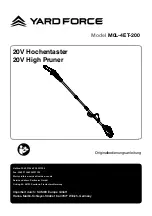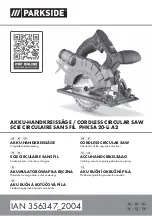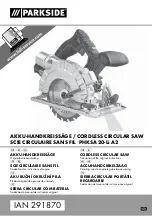
-20-
placed under the panel on both sides, near the line
of cut and near the edge of the panel.
-
Do not use dull or damaged blades.
Unsharpened or improperly set blades produce
narrow kerf causing excessive friction, blade
binding and kickback.
-
Blade depth and bevel adjusting locking levers
must be tight and secure before making the
cut. If blade adjustment shifts while cutting, it may
cause binding and kickback..
-
Use extra caution when sawing into existing
walls or other blind areas. The protruding blade
may cut objects that can cause kickback.
Lower guard function
-
Check the lower guard for proper closing
before each use. Do not operate the saw if the
lower guard does not move freely and close
instantly. Never clamp or tie the lower guard
into the open position. If the saw is accidentally
dropped, the lower guard may be bent. Raise the
lower guard with the retracting handle and make
sure it moves freely and does not touch the blade
or any other part, in all angles and depths of cut.
-
Check the operation of the lower guard spring.
If the guard and the spring are not operating
properly, they must be serviced before use.
Lower guard may operate sluggishly due to
damaged parts, gummy deposits, or a build-up of
debris.
-
The lower guard may be retracted manually
only for special cuts such as "plunge cuts" and
"compound cuts". Raise the lower guard by the
retracting handle and as soon as the blade
enters the material, the lower guard must be
released. For all other sawing, the lower guard
should operate automatically.
-
Always observe that the lower guard is
covering the blade before placing the saw
down on bench or floor. An unprotected,
coasting blade will cause the saw to walk
backwards, cutting whatever is in its path. Be
aware of the time it takes for the blade to stop after
switch is released.
Riving knife function
-
Use the appropriate saw blade for the riving
knife. For the riving knife to function, the body of
the blade must be thinner than the riving knife and
the cutting width of the blade must be wider than
the thickness of the riving knife.
-
Adjust the riving knife as described in this
instruction manual. Incorrect spacing, positioning
and alignment can make the riving knife ineffective
in preventing kickback.
-
Always use the riving knife except when
plunge cutting. The riving knife must be replaced
after plunge cutting. The riving knife causes
interference during plunge cutting and can create
kickback.
-
For the riving knife to work, it must be engaged
in the workpiece. The riving knife is ineffective in
preventing kickback during short cuts.
-
Do not operate the saw if the riving knife is
bent Even a light interference can slow the closing
rate of a guard.
Instructions on service and maintenance:
-
Regularly cleaning the machine, especially the
adjusting devices and guides, constitutes an
important safety factor.
-
Only original MAFELL spare parts and accessories
may be used. Otherwise the manufacturer will not
accept any warranty claims and cannot be held
liable.
4
Setting / Adjustment
4.1
Mains connection
Prior to commissioning make sure that the mains
voltage complies with the operating voltage stated on
the machine's rating plate.
4.2
Chip extraction
Connect the machine to a suitable external dust
extractor during all work generating a considerable
amount of dust. The air velocity must be at least 20
m/s (65.6 ft / sec.).
The internal diameter of the integrated extraction
connection 11 (fig. 3) amounts to 35 mm ( 1 3/8 in. ).
















































